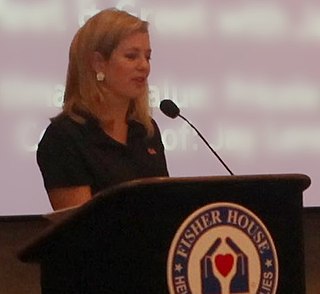A Quote by Jean Chatzky
People with financial plans are much more likely to feel prepared, even in tumultuous times. They're more likely to feel that their dreams and goals are secure. And, oh yes, they do actually save significantly more.
Related Quotes
People who graduate are more resilient financially, and they weather economic downturns better than people who don't graduate. And, throughout their lives, people who graduate are more likely to be economically secure, more likely to be healthy, and more likely to live longer. Face it: A college degree puts a lot in your corner.
It's actually a pretty basic concept: when businesses feel secure and confident, they are more likely to grow, hire, and invest. Conversely, when the economy is unstable, businesses often become much more risk averse, and in many cases, they're forced to make undesirable cuts that affect their bottom line.
It's an empirical question whether training makes one more or less likely to get in a fight outside the gym. In some ways, I'm probably more likely to get into a fight, because I feel more competent, and I know what it's cost me in the past to back down from fights, and I don't want to feel that way.
I've seen the same thing emerge in the research around the interaction of sleeping and moving and eating: if you get a good night's sleep, you are significantly more likely to make the right choices about what you eat the next morning, you're more likely to work out, you're more likely to get a better night's sleep the next night.
People were actually 6 times more likely to buy a jar of jam if they had encountered 6 than if they encountered 24, so what we learned from this study was that while people were more attracted to having more options, that's what sort of got them in the door or got them to think about jam, when it came to choosing time they were actually less likely to make a choice if they had more to choose from than if they had fewer to choose from.
The more invested I am in my own ideas about reality, the more those experiences will feel like victimizations rather than the ups and downs of relating. Actually, I believe that the less I conceptualize things that way, the more likely it is that people will want to stay by me, because they will not feel burdened, consciously or unconsciously, by my projections, judgments, entitlements, or unrealistic expectations.
It has been proven time and time again in countless studies that students who actively participate in arts education are twice as likely to read for pleasure, have strengthened problem-solving and critical thinking skills, are four times more likely to be recognized for academic achievement, four times more likely to participate in a math and science fair.
The point is that families today are spending their money no more foolishly than their parents did. And yet they're five times more likely to go bankrupt, and three times more likely to lose their homes. Families are going broke on the basics - housing, health insurance, and education. These are the kind of bills that you can't just trim around the edges in the event of a downturn.
We are living in times of great uncertainty. Likely no more so than in previous times but the sense of ambiguity may be more pervasive in light of the financial crash from which we have yet to recover. That means leaders need to step up their game. They need to more specifically in providing direction and in delivering inspiration.
Throughout my life, I have held the strongest belief that if you write down what you want to accomplish in your life: your dreams, goals, hopes and aspirations, you are much more likely to achieve them. I have been writing down my goals since I was a kid, and I've had more success than I could have ever dreamed of... one goal at a time.

































